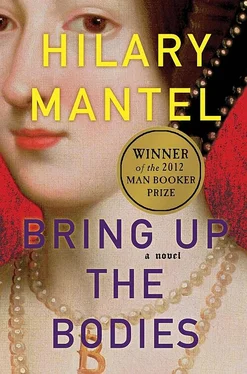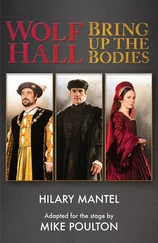‘I wish you would.’
‘First, this is a household matter. It is not within your remit. Second, she was in no danger. Third, I do not know who lit the candle. Four, if I did I would not tell you.’
He waits.
‘Five: no one else will tell you either.’
He waits.
‘If, as it may happen, some person visits the queen after the lights are out, then it is an event over which we should draw a veil.’
‘Some person.’ He digests this. ‘Some person for the purposes of arson, or for purposes of something else?’
‘For the usual purposes of bedchambers,’ she says. ‘Not that I say there is such a person. I would not have any knowledge of it. The queen knows how to keep her secrets.’
‘Jane,’ he says, ‘if the time comes when you wish to disburden your conscience, do not go to a priest, come to me. The priest will give you a penance, but I will give you a reward.’
What is the nature of the border between truth and lies? It is permeable and blurred because it is planted thick with rumour, confabulation, misunderstandings and twisted tales. Truth can break the gates down, truth can howl in the street; unless truth is pleasing, personable and easy to like, she is condemned to stay whimpering at the back door.
Tidying up after Katherine’s death, he had been moved to explore some legends of her early life. Account books form a narrative as engaging as any tale of sea monsters or cannibals. Katherine had always said that, between the death of Arthur and her marriage to the young Prince Henry, she had been miserably neglected, wretchedly poor: eaten yesterday’s fish, and so on. One had blamed the old king for it, but when you look at the books, you see he was generous enough. Katherine’s household were cheating her. Her plate and jewels were leaking on to the market; in that she must have been complicit? She was lavish, he sees, and generous; regal, in other words, with no idea of living within her means.
You wonder what else you have always believed, believed without foundation. His father Walter had laid out money for him, or so Gardiner said: compensation, for the stab wound he inflicted, the injured family paid off. What if, he thinks, Walter didn’t hate me? What if he was just exasperated with me, and showed it by kicking me around the brewery yard? What if I deserved it? Because I was always crowing, ‘Item, I have a better head for drink than you; Item, I have a better head for everything. Item, I am prince of Putney and can wallop anybody from Wimbledon, let them come from Mortlake and I will mince them. Item, I am already one inch taller than you, look at the door where I have put a notch, go on, go on, father, go and stand against the wall.’
He writes:
Anthony’s teeth.
Question: What happened to them?
Anthony’s testimony, in answer to me, Thomas Cromwell:
They were knocked out by his brutal father.
To Richard Cromwell: He was in a fortress besieged by the Pope. Abroad somewhere. Some year. Some Pope. The fortress was undermined and a charge planted. As he was standing in an unlucky spot, his teeth were blown clear out of his head.
To Thomas Wriothesley: When he was a sailor off Iceland his captain traded them for provisions with a man who could carve chessmen out of teeth. Did not understand the nature of the bargain until men in furs came to knock them out.
To Richard Riche: He lost them in a dispute with a man who impugned the powers of Parliament.
To Christophe: Somebody put a spell on him and they all fell out. Christophe says, ‘I was told as a child about diabolists in England. There is a witch in every street.
Practically.’
To Thurston: He had an enemy was a cook. And this enemy painted a batch of stone to look like hazelnuts, and invited him to a handful.
To Gregory: They were sucked out of his head by a great worm that crawled out of the ground and ate his wife. This was in Yorkshire, last year.
He draws a line under his conclusions. Says, ‘Gregory, what should I do about the great worm?’
‘Send a commission against it, sir,’ the boy says. ‘It must be put down. Bishop Rowland Lee would go up against it. Or Fitz.’
He gives his son a long look. ‘You do know it’s Arthur Cobbler’s tales?’
Gregory gives him a long look back. ‘Yes, I do know.’ He sounds regretful. ‘But it makes people so happy when I believe them. Mr Wriothesley, especially. Though now he has grown so grave. He used to amuse himself by holding my head under a water spout. But now he turns his eyes up to Heaven and says “the King’s Majesty”. Though he used to call him, His High Horridness. And imitate how he walks.’ Gregory plants his fists on his hips and stamps across the room.
He raises a hand to cover his smile.
The day of the tournament comes. He is at Greenwich but excuses himself from the spectators’ stand. The king had been at him that morning, as they sat side by side in his closet at early Mass: ‘How much does the lordship of Ripon bring in? To the Archbishop of York?’
‘A little over two hundred and sixty pounds, sir.’
‘And what does Southwell bring in?’
‘Scant one hundred and fifty pounds, sir.’
‘Do you say so? I thought that it would be more.’
Henry is taking the closest interest in the finances of the bishops. Some people say, and he would not demur, that we should put the bishops on a fixed stipend and take the profits of their sees for the treasury. He has worked out that the money raised could pay for a standing army.
But this is not the time to put it to Henry. The king falls to his knees and prays to whatever saint guards knights in the lists. ‘Majesty,’ he says, ‘if you run against my son Gregory, will you forbear to unhorse him? If you can help it?’
But the king says, ‘I would not mind if little Gregory unhorsed me. Though it is unlikely, I would take it in good part. And we cannot help what we do, really. Once you are thundering down at a man, you cannot check.’ He stops himself and says kindly, ‘It is quite a rare event, you know, to bring your opponent down. It is not the sole aim of the contest. If you are concerned about what showing he will make, you need not be. He is very able. He would not be a combatant otherwise. One cannot break a lance on a timid opponent, he must run at full pace against you. Besides, no one ever does badly. It is not allowed. You know how the heralds put it. As it might be, “Gregory Cromwell has jousted well, Henry Norris has jousted very well, but our Sovereign Lord the king has jousted best of all.”’
‘And have you, sir?’ He smiles to take any sting from the words.
‘I know you councillors think I should take to the spectators’ bench. And I will, I promise, it has not escaped me that a man of my age is past his best. But you see, Crumb, it is hard to give up what you have worked at since you were a boy. There were some Italian visitors once, they were cheering us on, Brandon and myself, and they thought that Achilles and Hector had come back to life. So they said.’
But which is which? One dragged through the dust by the other…
The king says, ‘You turn your boy out beautifully, and your nephew Richard too. No nobleman could do more. They are a credit to your house.’
Gregory has done well. Gregory has done very well. Gregory has done best of all. ‘I don’t want him to be Achilles,’ he says, ‘I only want him not to be flattened.’
There is a correspondence between the score sheet and the human body, in that the paper has divisions marked off, for the head and the torso. A touch on the breastplate is recorded, but not fractured ribs. A touch on the helm is recorded, but not a cracked skull. You can pick up the score sheets afterwards and read back a record of the day, but the marks on paper do not tell you about the pain of a broken ankle or the efforts of a suffocating man not to vomit inside his helmet. As the combatants will always tell you, you really needed to see it, you had to be there.
Читать дальше
Конец ознакомительного отрывка
Купить книгу












